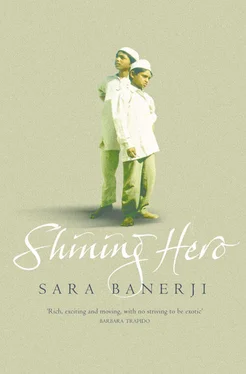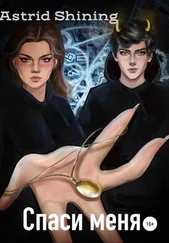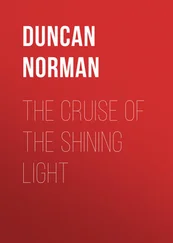‘What is wrong with her?’ she asked Meena later. ‘Has she been ill, or something?’
‘There is nothing wrong at all,’ said Meena. ‘Koonty is, as is to be expected, feeling somewhat apprehensive about the coming ceremony, which is due to be quite the biggest event this village has seen since the marriage of the old zamindar and at which very much will be required of her. I myself was rendered unconscious several times over during my own wedding and I was only marrying into a middle-income family, though of unfortunately large genes. So you may imagine how it must be for your sister. Also she is behaving, at last, with the dignity of a woman who is about to become the bride of the zamindar though you, with your cavortings round the villages, would not know anything about proper behaviour.’
‘Ma must be right,’ thought Shivarani, but all the same could not get from her mind that there was something more wrong with Koonty than dignity or apprehension.
After a while Meena admitted that Koonty had been depressed ever since the day she lost the golden jewel that Pandu had given her. ‘Even after I told her, don’t worry about that, for at the wedding she will be given a hundred times as much gold and that I am sure the young zamindar will not be angry but will give her another if he comes to know of the loss, she has not been made happy.’
‘Koonty is forever losing things. The last time I was here she had mislaid the sovereign piece that the zamindar had given her and she didn’t seem to mind a bit. You were the one who was furious,’ protested Shivarani.
‘Then there was the episode at the river,’ went on Meena. ‘When you were away she tried to rescue a kitten, or so we think, though she will not talk about it. However, it seems that the creature was carried away by the current and it is from that time that Koonty seems to have suffered from a lowering of the spirits. Perhaps you can talk to her and see if you can find the source of the trouble.’
Shivarani managed to persuade Koonty to come out of her room and be measured for a blouse to go with her wedding sari. Koonty emerged unsteadily and stood passive while Shivarani wound the tape measure round her body. ‘I think it’s stupid to be making more blouses,’ she said. ‘Considering how you told me they are sending me fifty-three new ones, stuck to trays with sellotape, from the Hatibari.’
‘Keep still,’ said Shivarani, her mouth full of pins. ‘Are you looking forward to the wedding?’
‘Yes,’ said Koonty in a voice that made it sound like ‘no’. Her thoughts seemed far away.
‘Why do you keep staring at the river? Can you see something there?’
‘No reason,’ said Koonty and looked down at her feet as though the question frightened her.
‘Do you know what happens on the wedding night?’ she asked. Koonty said nothing, but something wet touched Shivarani’s bowed-over neck and when she looked up she saw that there were tears falling from Koonty’s eyes.
Shivarani asked, ‘Do you want me to tell you?’ wondering how to phrase it if Koonty said yes.
‘No,’ said the girl. ‘I do know. You needn’t tell me.’
As the day of the wedding approached the activity of Hatipur reached fever pitch. From every side came the sound of hammering, as decorations were erected, the pandal completed, the ovens for cooking the feast erected. Meena had to take to her bed twice in the course of that last week, overcome by nervous exhaustion. Every man and woman and child in the village was occupied in some way with the preparations for the ceremony itself or purchasing or manufacturing gifts and overseeing the stitching of their own new outfits. The wedding was to last two weeks, and the richer people of the village planned to wear different clothes on every day. Goats, chickens and sheep were being fattened for slaughter and the flour for ten thousand chupatties purchased, for two thousand people would have been fed by the time this wedding was over.
These days every conversation in the village would sooner or later come to the subject of the wedding gifts. People tended to panic on hearing what someone else was giving, and would rush away and exchange what they had already bought for something more expensive. The widows were sewing a pair of three-foot-high dolls, dressed in UK bridal outfits, for their gift. Laxshmi was giving the bridal couple her best mother hen, who, when broody, had not left her eggs during the loudest fireworks of Diwali and had fought off a water buffalo that had come too near her chicks.
The misti wallah was creating a vast shandesh fish, big enough for five hundred people, and decorated with leaf of gold and pearls from Hyderabad. The rickshaw wallah, whose rickshaw had been painted gold, was going to transport guests free of charge.
A special tent was erected for the viewing of the bride and groom and on the day row upon row of guests poured into it, their eyes fixed on the two empty thrones which were soon to be occupied by the bridal couple. As they waited silver trays of sandal paste were circulated for the guests to ornament their foreheads, some Europeans among them eating this, mistaking it for a ritual snack.
There came gasps of delight when, at last, the bridegroom arrived. He had ridden from the Hatibari on a white Marwari horse, and had to be led to his chair, because the strings of jasmine flowers hanging from his pith helmet obscured his sight. Now all eyes were on the entrance for a first sight of the bride.
But she did not come. She could not be found. Though she had been kept inside her room and constantly surrounded by female relatives, when the moment arrived for her to be taken to the pandal in the golden rickshaw, she was not there. ‘I left her for a moment to get a glass of water,’ said an aunt. ‘She was there two minutes ago. I dashed off to get a safety pin, in case she pulled out the sari folds,’ said a cousin. The family wasted precious time beating on the locked door of Koonty’s room and begging her to let them in.
The guests waited and wondered what was happening.
Eventually a carpenter was called, and managed to break the door lock. The room was empty. Koonty’s wedding outfit that had taken such hours to arrange, was flung over the floor and the window was open.
Meena began to wail and accuse her husband, saying, ‘I told you we should have bars put on her window. My friends from the Calcutta Club will be filled with malicious pleasure when they discover.’
They must find her quickly, the family knew, before the guests discovered that the bride, moments before her wedding, had ripped off all her clothes, climbed out of the window and run away.
The guests were growing restless and the bridegroom kept looking towards the pandal entrance like someone waiting for a bus. The Calcutta Club ladies began to whisper delightedly to each other, suspecting and hoping for a scandal. Meena, overwhelmed with self-pity, shame and fury, wanted to go to bed and lie in the dark with an iced sponge over her forehead but instead ran this way and that like a hen who had lost her chicks.
It was Shivarani who finally found Koonty. The girl, wearing only her petticoat and blouse, was sitting on the river bank, staring into the water as though she had lost something. Shivarani sat down beside her and putting an arm round her, said, ‘Tell me what the matter is.’
Koonty stared into the water and was silent for ages. Then she said, ‘Didi, if someone put a newborn baby onto a floating goddess’ hand, how long do you think it would stay alive?’
‘That’s silly. Come back. All the guests are waiting, and Pandu is feeling very sad.’
‘And do you think that if someone saw a hand of Durga floating by, with a little newborn baby lying in it, that they would rescue the baby? Do you think that, Didi?’
Читать дальше











